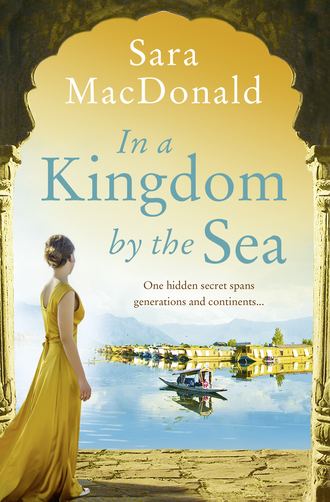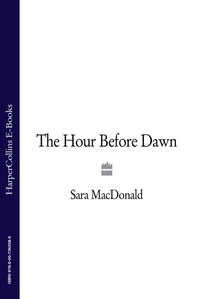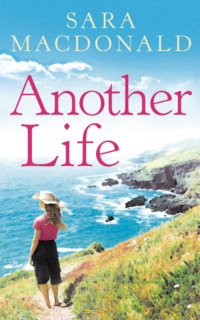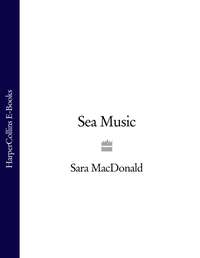
Полная версия
In a Kingdom by the Sea
‘Of course I do,’ I say, with a little intake of breath. Kate rarely makes unhelpful comments like this, but we’ve all had quite a lot of wine. ‘But, I’m used to it now. I don’t know anything else. And,’ I add, because Kate and Hugh are watching me across the supper table and I know what they are thinking, ‘after a lifetime of working away, Mike always comes home to me and the boys.’
Kate and Hugh lift their glasses to me and make a Christmas toast but I see Kate place her left hand flat on the reclaimed kitchen table as if she is touching wood.
CHAPTER EIGHT
Oman, Christmas 2009
Stark brown mountains rise up out of a choppy indigo sea. Sunlight falls on rocks making golden veins among the shadows of crevices. Fishing dhows scud across the water. I watch Will and Matteo floating in the aquamarine infinity pool that slides swimmers effortlessly towards the glistening horizon. There is sensory pleasure everywhere. Small tables lit by flickering candles among palm trees. Sunloungers placed on a crystal beach of tiny shells. Our adjoining rooms have small balconies that open out onto the Gulf of Oman and the turquoise Arabian Sea.
On Christmas morning the boys appear in silly hats and wake us. They have filled tiny stockings for us and they sit on the end of our bed watching as we open them. Mike laughs but I can see he is touched by their small student gifts.
We sit in a huge bed facing our lanky sons with their crossed hairy legs and dishevelled hair and Mike says, throwing his arm round me, ‘My God, where did the time go? How did my sons get so enormous? I still see them in those tiny white dressing gowns I bought in Dubai …’
‘I still have those little dressing gowns,’ I say.
This might be the last time the four of us spend Christmas together, without girlfriends, without Will and Matteo itching to be skiing with friends or elsewhere.
In the evening, after we have eaten under the stars, Will and Matteo head off to find other young people at an organized beach party. Mike cautions them about keeping away from anyone doing drugs and stresses the strict penalties in Oman for breaking the law.
Will says, ‘Dad, we’ve been in and out of Muslim countries all our lives … we’re not going to be that stupid.’ And they disappear towards a crowd of noisy young people congregating on the beach.
Mike and I sit watching the decorated camels with elaborate headdresses sitting crouched by the candlelit night stalls. Veiled and silent Saudi women watch their husbands smoking hubble-bubble pipes. I wonder how these women keep their boredom in check. The camels have more fun.
‘Let’s walk,’ Mike says, stretching and taking my hand. We drift among the hibiscus gardens down to the beach path.
There are long, squishy sofas under the palm trees, full of small collapsed children. The last time we were here Will and Matt were six and seven.
‘Where did the time go, Gabby?’ Mike says, echoing my thoughts. ‘It’s hard to accept my sons probably don’t need a lecture on the risks of drug taking in a Muslim country.’
Is Mike mourning the loss of his children or his own lost youth?
‘Oh, I think they do need reminding. They’re still young and not immune from peer pressure.’
I notice the tiredness around his eyes. It has been a lovely Christmas, but Mike seems preoccupied and quiet.
‘How is it going in Karachi?’ I ask. ‘Truthfully.’
‘I’m fine.’ He is abrupt. ‘I want to forget about work for a few days.’ But, he doesn’t. He can’t.
I ask someone to take a couple of photos of us standing with our backs to the Arabian Sea. Later, I see they are too dark. My flash has not worked and we are like ghosts in a landscape of stars. Christmas 2009. Mike and I, not quite real, standing in a backdrop of navy sea.
For the rest of our holiday Mike lies comatose on his lounger, plugged into his music. In the afternoons, he goes back up to the hotel to sleep in the cool. It feels a little as if he is screening us out. I tell myself not to be selfish, that he needs to unwind.
Will and Matteo float between us and the groups of young people who migrate together like starlings. I stay outside under a sun umbrella. I don’t want to miss a moment of sun and sea and mountains.
One afternoon, Matteo, reading beside me, puts his book down. ‘Dad seems a bit played out this holiday. Usually, he wants to hire a boat or do something.’
‘He would never admit it, but I think his job is proving a challenge. He’s weary, Matt.’
Will appears. He had gone back to the hotel to fetch his iPod.
‘Dad’s not resting, Mum. He’s bloody working. He’s writing emails and phoning Karachi …’
Will sounds so unaccountably angry I sit up, startled.
‘I told him that if he’s not sleeping he should be spending time down here with you. You’re on your own the whole bloody time. He’s spent a fortune on getting us here and then he slopes off to work every afternoon …’
‘Will, come on, be fair. He has to keep in touch with his office …’
‘There you go again. Just accepting everything, all the time, just as you always do. You’ve been apart for six months and Dad can’t even be truthful about why he slopes back to his room every afternoon … You know what, Mum, how different are you from those veiled … passive Saudi wives we saw at lunch today, lifting their stupid bits of material so they can poke food into their mouths, because of some male edict …’
Will throws his iPod and book onto his lounger and heads for the sea.
Shocked, I watch him walk away. This is so unlike him.
‘Go after him,’ I say to Matteo. ‘Do you think they had a row or something?’
Matteo walks across the sand and he and Will both stand with their backs to me, heads bent together. Voices carry over water and I hear Matt say, ‘Will, you can’t be sure and you certainly can’t say anything to Mum …’
Will shrugs, enters the water and starts to swim away. Matt walks back to me.
‘What is it?’ I ask.
Matteo drops on the sand beside me. ‘Will’s not angry with you, Mum. He caught Dad sitting out on the balcony having a long chatty conversation. He got mad that he wasn’t down here talking to you. Dad’s gone to all this effort and expense but he isn’t really here with us, is he? He’s still in Karachi.’
I know Matteo is right, but I say, ‘Matt, if your dad wants to disappear in the afternoons to rest and unwind, why shouldn’t he?’
‘But he’s not resting and unwinding, is he? He’s working. Dad chooses to live and work away from us. We are only with him for a few days. Is it too much to ask that he unplugs his bloody music and engages with us when we are all together? That he doesn’t leave you on your own every single afternoon?’
‘I don’t mind …’
‘Well, we do. We worry about you, Mum …’ He jumps up. ‘Listen to me. This is stupid. Will and I are adults, for Christ’s sake, not four year olds. Dad will always be Dad. It’s just, Will and I always hope things might change as we get older and it never does …’
I never knew. I never knew my sons felt like this.
On our last evening in Oman, I sit on the sea wall looking out over the Arabian Sea towards Iran and Pakistan. Behind the mountains the sky is ochre and pink and gold. A small wooden dhow with a white canopy is moored, turning in the breeze.
Will and Matteo come and sit each side of me. We sit in companionable silence watching the sky and sea catch fire.
‘Reminds me a bit of Cornwall,’ Matt says, after a while. ‘That feeling of awe and sad insignificance in the sheer power of …’
‘Sad insignificance!’ Will jeers, leaning over me to peer at his brother. ‘Wha …’
‘Oh shut up,’ Matteo says before Will can say any more.
I smile. My eldest son will now make everything sadly insignificant all evening.
‘Ignore him,’ I say to Matteo. ‘I know what you mean. The power and beauty of nature does make you feel small and insignificant.’
‘Sometimes,’ Matteo says, ‘I forget Mamie and Gramps are dead.’
‘I wish we could have kept their house in Cornwall,’ Will says. ‘We shouldn’t have sold it.’
‘We had to sell. Dominique needed the money and …’
‘Why couldn’t you and Dad have bought her out?’
‘Because the house needed a fortune spent on it and we still have a sizeable mortgage on the London house …’
‘But it would have been possible, wouldn’t it, if Dad had wanted to keep it too? You could have rented it out for a fortune each summer to help with the mortgage.’
I do not want to revisit the pain of letting my home go. Mike and I had argued vehemently. It was the only thing I had ever asked or fought for. He was right though. We had two boys to put through university. Pouring money into repairing a house hundreds of miles from where we lived was not practical. We did not have unlimited resources. Yet selling it nearly broke my heart.
‘It was the wrong time. Too much work and too much money and I was reeling with shock …’
‘It was awful. I can’t imagine what it would be like if you and Dad died within months of each other …’ Matteo says.
‘Mum?’ Will says. ‘Did you ever think it odd that Gramps drowned?’
I stare at him.
‘I mean. He knew the sea. He fished all his life …’
‘Fishermen drown, Will.’
‘Yes, but Gramps could spot weather coming in faster than anyone. He never got it wrong. So why was he out in a force eight gale?’
‘He was in his eighties. He must have misjudged the speed of the storm …’ I say, uneasily, trying to banish the image of a little boat foundering in huge seas.
‘We’ll never really know why he was out in rough weather, will we?’ Matteo says quietly.
At that moment, Mike arrives looking showered and spruced, followed by a waiter carrying a glass of drinks.
‘Ah!’ he calls. ‘I’ve found you. My lost family! As it’s our last night here, I have pushed the boat out. I have champagne!’
Never have three people been so happy to see him. He’s seemed so much happier and more relaxed these last two days. We jump up and hug him until he is overwhelmed. Who knows when the four of us will all be together again.
‘My God! What did I do to deserve all this? It is only one bottle of probably doubtful champagne …’
Will holds his glass up to him. ‘Every now and then, Dad, you remind us of why we love you. Your timing is impeccable. This is perfect.’
I watch Mike’s face. A myriad of emotions cross it. He is touched and trying not to show it. My heart turns. I don’t need to be reminded of why I love him.
CHAPTER NINE
Karachi, 2009
Nothing could have prepared me for Karachi Airport. It is a swirling mass of earthy, colourful humanity. As the plane doors slide open there is a tall security man with a thin moustache and a severe, unsmiling face waiting. I know this is Mahsood, an alarming ex-military man, who regularly navigates Mike through the horrors of Jinnah International Airport.
We are first off the plane but there is a press of people behind us. Mike grabs my hand luggage and Mahsood grabs my documents and passport.
‘Follow close, please …’ Mahsood takes off at speed through the masses pouring off incoming flights. Mike and I dash after him as he navigates a passage through the crowds.
‘Don’t take your eyes off his back,’ Mike says. ‘Or we will lose him.’
Easy to say, but there are people pushing in all directions, struggling with parcels and bundles and small children, all pushing relentlessly forward before coming to an anxious halt at one of the numerous security checks.
Mahsood guides us to the head of a queue, like VIPs. We stand awkwardly to one side as he offers up our passports to moustached officials. Even Mahsood cannot hurry the deliberately slow perusal of our papers. Dark eyes flick over us from stiff official faces. I am relieved when we eventually reach the baggage carousel.
‘My God,’ I say to Mike. ‘I wouldn’t like to go through this airport on my own.’
‘It’s hell. I wouldn’t even try without Mahsood.’
Mahsood keeps us close to him like a sheepdog, his eyes ranging nervously across the airport as if danger might come from any direction. When I ask to go to the lavatory, he comes to the door and stands guard until I return.
As we wait for our luggage Mike chats to some PAA airport officials. Other than the briefest of nods I remain unacknowledged. I feel like a stranded alien in the middle of a dizzying island of chaos and I have my first glimpse of what it might be like to be a woman in Pakistan.
I am relieved when we have our luggage and Mahsood is herding us briskly out of the terminal. It is early evening and the sun is low. There is the smell of dust and petrol and, faintly, of sewerage. The world is tinged in an orange glow and I feel a visceral pull, as if I am standing on the edge of a still photograph about to plunge into lives both unknown and familiar.
Mike smiles at me. ‘Okay? The worst bit is over!’
Armed soldiers are weaving between the taxis, looking into the boots of cars. I can see there is a heavily guarded checkpoint in and out of the airport. Mike had not mentioned there were guns everywhere. It is a bit of a shock.
Noor, Mike’s Pashtun driver, is standing by his car waiting for us.
‘Welcome to Pakistan, mem.’
He is a young, stocky man with extraordinary, luminous green eyes and a big smile.
‘Thank you.’ I hold out my hand and Noor grasps it.
Mahsood climbs into the front seat and the car is waved through the checkpoint. Mike leans towards me.
‘Gabby, women don’t offer their hands to men in Pakistan. I just thought I would tell you …’
‘Oh,’ I say, surprised. ‘Noor did not seem to mind.’
Mike laughs. ‘Of course he didn’t mind. He will have taken it as a compliment …’
After a few miles, Noor turns off the dusty road and stops in the middle of a treeless square. Apartments as bleak and lifeless as a Russian suburb rise up in the distance. Mahsood slides out of the car and disappears into the shadows like a moth.
I stare after him. ‘That’s spooky. Where does he go? It’s pure John le Carré …’
‘I presume Mahsood lives in one of those flats,’ Mike says.
As we join the main throughway traffic thunders with frightening speed on both sides of the car. There are entire families on motorcycles weaving and wobbling through the traffic. Toddlers are wedged between their parents; babies are literally dangling over handlebars.
Mike and Noor laugh at my horrified face. ‘It still rush hour, mem,’ Noor says.
Fascinated, I peer out of the window at the explosion of vehicles and roar of sound. Intricately painted buses, lopsided with people, sway past like decorated elephants. I catch glimpses of gold-ringed fingers and frangipani bangles on thin wrists. Everywhere there are fleeting flashes of colour like the sun blazing through trees. There are saris and shalwar kameez, in red, gold and aquamarine.
Eyes rest for fleeting seconds on mine as they shoot past. Rings glitter on exquisite noses. Dupattas are drawn over glossy dark hair. Horns blare, insults are exchanged, accidents averted by a whisker. This is not so much a journey but an abrupt and terrifying assault on the senses. I am captivated.
When we reach the gates of the Hotel Shalimar there is a checkpoint. Armed security guards peer into the bonnet of the car and run a bomb detector over the passenger seats and floor and then under the car.
We drive up a small drive with another ramp and Noor parks outside the large glass entrance. He places our luggage on an X-ray conveyer belt that slides into the hotel. A uniformed doorman scans Mike’s wallet, my bag and our mobile phones.
I follow Mike through the glass doors. It certainly is a secure hotel. The foyer has a marbled floor and is full of lighted chandeliers, potted plants and soft music. Two women in beautiful shalwar kameez stand smiling behind the reception desk.
‘Mr Michael! Welcome back! Welcome, welcome, Mrs Michael, to the Shalimar Hotel! We are so happy that you have come to visit Karachi …’
I can see Mike is pleased at their effusive welcome.
‘Gabby, this is Rana, the head receptionist at the Shalimar, and this is Pansy, Rana’s able assistant. They are magicians and will find you anything you need …’
Rana, the older woman, shakes my hand. She has a sweet open face. ‘Indeed, Mrs Michael, we are here to help …’
Pansy places her hands together in a shy bow. She is well named. She is an exotic little flower.
A boy puts our luggage on a trolley and then heads for the lifts.
‘It’s good to be back,’ Mike calls to the two women as he guides me after him. ‘Thank you both for a lovely welcome …’
‘Please, to let us know if anything is missing for the comfort of your wife, Mr Michael …’ Rana calls after us as the lift doors open.
In the lift, Mike starts to laugh. ‘Rana and Pansy are usually off-duty by this time. They were obviously determined to catch a glimpse of you before they went home. Rana can seem a bit overwhelming in her desire to help, but it is the hospitable Pakistani way. She genuinely wants everyone in the hotel to feel at home …’
On the third floor we walk down a long empty corridor. Mike puts his card in the lock of a door and pushes it open. He waves me inside with a little flourish and tips the boy with the luggage.
The main room is huge, with picture windows from floor to ceiling that frame the reddening city below. There are dusty crimson drapes everywhere, even around the double bed that lies in state at one end.
It is as if time has stopped. The rooms are full of dust motes caught in the last swirling rays of the sun. Everything is faded by sunlight. A defunct old fan is still attached to the ceiling. I can almost feel the colonial swish of it displacing the air.
The shabby drapes hold a hint of tobacco smoke deep in their folds. I turn round in the middle of the room, captivated by a feeling of other lives, other tongues, lost worlds.
In the shadows lies a disappeared Pakistan, filled with dignitaries who drank and smoked and partied with impunity. There is a little smoking room with sagging sofas and two bathrooms with yellowing cracked baths.
There is such an evocative, dilapidated glamour in Mike’s new home. A place frozen in time; a place of ghosts, a place to paint, to write books or dream.
Mike is watching me. ‘I know it’s a bit shabby …’
I turn and stare at him. ‘Shabby? It’s wonderful, Mike. Apart from the bathrooms.’
His eyes light up. ‘It is of its time, isn’t it? Just shower, don’t bath. Kamla, the cleaner, comes each day but something else just falls off in the bathrooms …’
Mike fiddles with the air-conditioning. ‘Gabby, would you mind if I ordered supper up here, tonight? I’ve been away for a week and I need to ring Shahid to bring myself up to speed. If we eat in it means I don’t have to change. Eating in the dining room is quite a long drawn-out process as the waiters will want to try to tempt us with new dishes.’
I don’t mind at all. In fact it is lovely. Two young waiters roll in a trolley full of silver dishes, then set up a table with a white cloth and starched napkins.
I glance at my watch. How strange. Here I am, in a world of pink drapes and armed guards, and Will and Matteo will still be in the air, somewhere, heading for London.
As we lie curled in the huge, draped bed, I have a stab of pure contentment. I don’t think either of us was entirely relaxed in Oman. Maybe there was too much pressure to have a fantastic Christmas together. I wish Mike could have been as easy as this with the boys.
I lie listening to the noisy air-conditioning. It sounds like the roar of the surf in a storm, a sound so familiar it lulls me to sleep in seconds.
CHAPTER TEN
Cornwall, 1967
Maman rarely talked about her childhood. If Dominique and I asked questions she would evade them. If we persisted, her face would close and she would walk away from us and remain distant for the rest of the day.
It was as if her life started from the time she met Papa. We heard that story enough times. Dominique especially loved it because she featured in it.
Papa, moored in a Brittany harbour on his father’s fishing boat, caught sight of a lovely woman and a pretty little girl dancing at a festival.
‘Love at first sight!’ Papa declared; for both Marianne and Dominique, aged three.
The rest is history. Well, not quite. He could not carry them both home to Cornwall in a fishing boat. Women were not allowed on the boats in those days and in any case Maman took some persuading. She was wary of men and did not want to leave France. But of course, Maman was never going to lose her handsome Cornishman. When she came over to visit Papa she realized that living in Cornwall would not be very different from living in Brittany.
Maman was connected to the earth in a very French way. Gardening mainly meant food and I loved watching her grow a huge array of fruit and vegetables in the kitchen garden. Papa dug out a small allotment for her out of the corner of the small field behind the orchard.
She planted sweet peas and flowers between the fruit and veg and she fed half the village. When she got chickens Dominique and I hastily gave them all names so that she could not cook and eat them. Tilly, Misty, Hetti, Susan, Agnes …
Maman capitulated and grew to love all her chickens. She would pick them up and stroke them like cats. She cried as hard as the rest of us when the fox did his worst, which he often did.
Neither Maman nor our aunt Laura ever talked about their childhood or our grandparents. It was a mystery, a closed book. Aunt Laura once told Dominique and me that it was the kind of childhood you left behind as soon as you could and tried never to revisit.
Maman was an enigma. She loved to help people yet there was a core of steeliness in her that sometimes shocked. I hoped that when she grew old she would tell me about her childhood, about my grandparents, but she never did. Her paternal grandmother had been Moroccan but we only knew this from Aunt Laura.
She was also unforthcoming about her life before she met Papa. As Dom grew older she was naturally curious about her biological father. She wanted to know how she came to be born. Maman was unnecessarily truthful and evasive at the same time. She always said the same thing: Dominique’s father had just been someone she had gone out with a few times. He was a student. She knew little about him. He had disappeared before she even knew she was pregnant. She was sorry, but there was nothing more she could tell Dominique about him.
How old was he? What was he studying? Was he good looking? Was he nice? What had they talked about? Dominique would not let it go. Was she like him? Had Maman got a photo of him?
The stories our parents tell us of our birth root us in family life. How hard would it have been for Maman to make up a little comforting fairy story for Dominique? But she never did. As I got older, I realized there must have been shame and trauma attached. Maman simply could not bear to talk about him.
If Dominique appealed to Papa for more information he would look uncomfortable. He was loyal to Maman and, I think, embarrassed about how little he knew of her life before he met her. Maman must have told him something about Dominique’s father before she married him, but Papa was never going to talk to us behind her back.
He would beg Dominique and me not to upset Maman, to respect her wishes and her right not to talk about her past.
‘Don’t I have a right to know who my own father was?’ Dominique would cry.
‘I hope you think of me as your papa, my little bird. I couldn’t love you more,’ Papa would reply.






